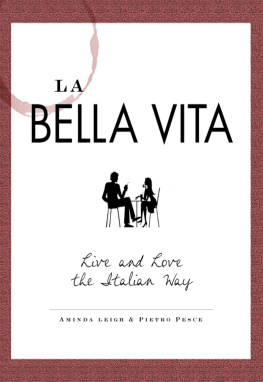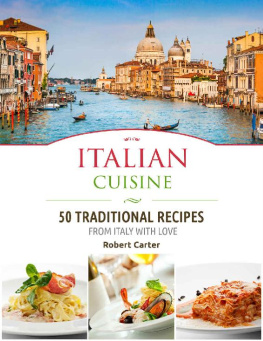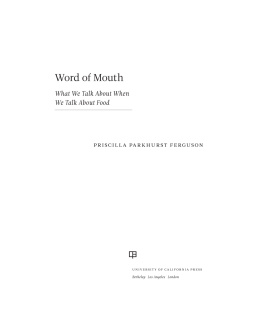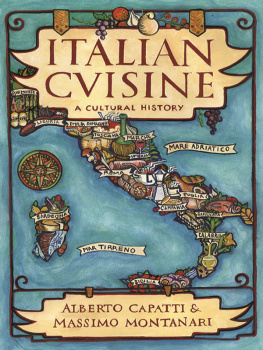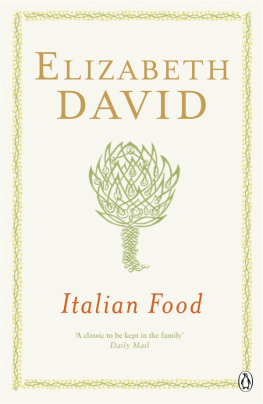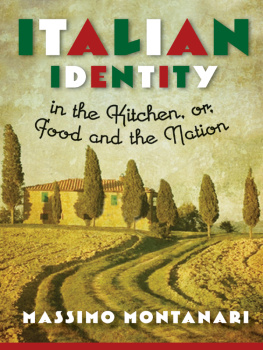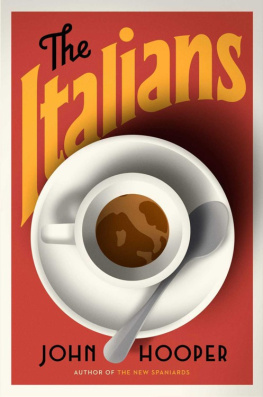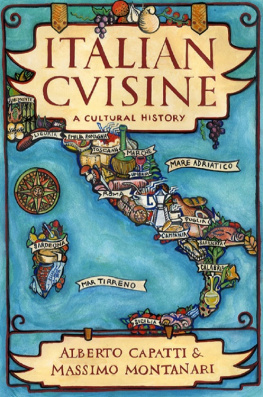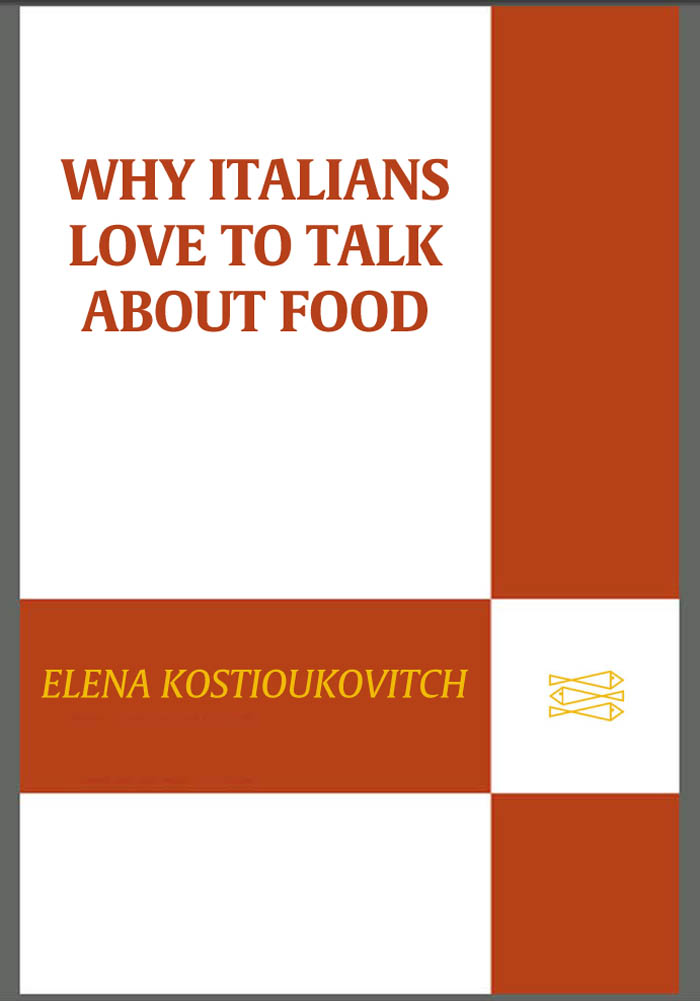Why Italians Love
to Talk About Food

ELENA KOSTIOUKOVITCH
Translated from the Italian by Anne Milano Appel

FARRAR, STRAUS AND GIROUX
NEW YORK
Farrar, Straus and Giroux
18 West 18th Street, New York 10011
Copyright 2006 by Elena Kostioukovitch
English translation copyright 2009 by Anne Milano Appel
Foreword by Umberto Eco copyright 2009 by Umberto Eco
Foreword by Carol Field copyright 2009 by Carol Field
Map of Italy copyright 2009 by Jeffrey L. Ward
All rights reserved
Distributed in Canada by D&M Publishers, Inc.
Printed in the United States of America
Originally published in 2006 by Sperling and Kupfer Editori S.p.A., Italy, as Perch agli Italiani
Piace Parlare del Cibo
Published in the United States by Farrar, Straus and Giroux
First American edition, 2009
This work was translated from the Italian version published by Sperling and Kupfer Editori S.p.A., Milan.
Emanuela Guercetti first translated the work into Italian from the original Russian language.
Grateful acknowledgment is made for permission to reprint excerpts from the following: Bodalsya Turin s Kokakoloi by Elena Babaytseva courtesy of Nezavisimaya Gazeta. Italian Journey, 17861788 by Johann Wolfgang von Goethe, translated by W. H. Auden and Elizabeth Mayer, copyright 1962 by W. H. Auden and Elizabeth Mayer, reprinted by permission of Curtis Brown, Ltd. Sonetti by Giuseppe Giaocchino Belli, edited by Giorgio Vigolo with the collaboration of Pietro Gibellini, Mondadori, Milan, 1984. Le meraviglie dItalia by Carlo Emilio Gadda, Einaudi, Turin, 1964. Il pentolino magico by Massimo Montanari, Gius. Laterza & Figli S.p.A., Roma-Bari, 1995. Maccheronata. Sonetti in difesa dei maccheroni by Gennaro Quaranta, Arti Grafiche La Nuovissima, Naples, 1943. A Roman Journal by Stendhal, edited and translated by Haakon Chevalier, Orion Press, New York, 1957.
Library of Congress Cataloging-in-Publication Data
Kostioukovich, Elena.
[Perch agli Italiani piace. English]
Why Italians love to talk about food / Elena Kostioukovitch; translated by Anne Milano Appel. 1st American ed.
p. cm.
Includes bibliographical references and index.
ISBN-13: 978-0-374-28994-2 (hardcover : alk. paper)
ISBN-10: 0-374-28994-8 (hardcover : alk. paper)
1. Cookery, Italian. 2. Food habitsItalyHistory. I. Title.
TX723.K6813 2009
641.5945dc22
2008041566
Designed by Jonathan D. Lippincott
www.fsgbooks.com
1 3 5 7 9 10 8 6 4 2
For Carla Tanzi
Contents

Foreword by Umberto Eco
Why should I be writing the foreword to a book about food? I asked myself the same question when the author asked me. I agreed, at first, because Elena Kostioukovitch is my translator in Russian, and I admire her not only for the care and patience she has shown toward my books, but also for her intelligence and vast culture. But is this reason enough, I wondered, given that I am not a gourmet?
To be clear, a gourmet is not merely someone who is content with an excellent duck lorange or a generous portion of Volga caviar with blini. This person is just a normal individual whose tastes havent been perverted by McDonalds. A gourmet, an epicure, a true enthusiast of cuisine, is someone capable of traveling hundreds of kilometers to go to that special restaurant where they make the best duck lorange in the world. And I am not that sort of person. Generally speaking, given a choice between eating a pizza a few doors down the street and taking a taxi to go discover a new trattoria (especially one two hundred kilometers away), I choose the pizza.
But is that really true? I realized that I had traveled kilometers and kilometers in the Langhe (near where I was born, and which Elena speaks of in the chapter on Piedmont) to take a French friend (who, indeed, is a grand gourmet) to discover the legendary white truffles, and additional kilometers to take part in a bagna cauda dinner in Nizza Monferrato, where the meal began at noon and ended at five in the afternoon and everything, except the coffee, was based on garlic. And I once went to the most remote outskirts of Brussels to sample that Belgian beer called gueuze that is only served locally, since it will not stand up to transport (by the way, dont go; a good British ale is better).
So does cuisine interest me or not? Lets return for a moment to the examples I cited. In one instance it was to discover what type of beer the Belgians like, another time to introduce Piedmontese culture to a foreigner, and the third time to rediscover the zest of a ritual like the bagna cauda that brought back magical moments of my childhood. In all these cases I went looking for food not simply to satisfy my palate, but to experience a certain kind of culture; not only to savor a taste, but to experience enlightenment, or a flash of recollection, or to understand a tradition and make it known to others.
And I realized that if I am alone, Ill certainly go and have a pizza in a small trattoria down the street rather than venturing out on a culinary exploration. Yet as soon as I arrive in another country, even before visiting the museums or churches, I do two things: to begin with, I wander through the streets, trying to lose my way in order to observe the people, the shop windows, the colors of the houses, and to savor the aromas; and then I seek out the local food, because without the experience of food I would not understand the place Im in and its unique way of thinking.
I also realized that with the exception of Foucaults Pendulum, where the heroes travel outside of Italy and come to understand Brazil by starting with a taste of Brazilian food, in the other novels (Baudolino, The Island of the Day Before, and my latest, The Mysterious Flame of Queen Loana), I make the protagonists eat a number of diverse Italian foods, just as I make the monks in The Name of the Rose eat at least once, and roam around the kitchen a great deal. If you venture out to the islands of the South Seas or to the Byzantine Orient, or to a universe that vanished hundreds or dozens of years ago, you have to let the reader eat in order to make him understand how the characters think.
I therefore have an excellent reason to introduce Elenas book. Because Elena, who certainly shows herself to be a prodigious connoisseur of Italian cuisine in all its nuances and mysteries, leads us by the hand (and lets say also by the palate and the nose) on a culinary journey, not only to familiarize us with Italian foods, but also to acquaint us with Italy, the country she has spent her life discovering. The book that you are about to read is a book about cuisine, but its also a book about a country and a cultureindeed, about many cultures.


